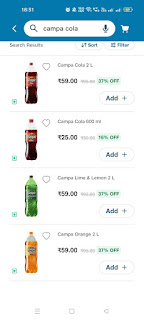WELCOME BACK CAMPA COLA
The brand is purchased by Reliance from Delhi based FUTURE DRINK GROUP.
Reliance's chairman Mukesh Ambani purchased the brand in august 2022 with a deal of 22crores.By this,Reliance is entering in FMCG sector to sustain the localised brands of India.
Reliance has launched its three flavours on this Holi-Orange,Lemon and Cola.
It is available on Reliance's grocery app-Jiomart.
Campa Cola is of 70s but it declined due to competion.Let's go dive into the historic competion market of cold drinks in India.
STARTING
Campa Cola is a carbonated soft drink brand that was introduced in India in 1977. It quickly gained popularity and, along with other global brands such as Coca-Cola and Pepsi, became one of the most popular soft drink brands in India.
However, the brand encountered numerous legal and regulatory challenges in India, and production ceased in 2000. Despite this, Campa Cola continues to remain a special place in many Indians' hearts as a memorable remembrance of their childhood and youth.
MAN BEHIND CAMPA COLA
The late Ramesh Chauhan, who is frequently referred to as the "father of Indian soft drinks," founded the Pure Drinks Group in the 1940s.
As a forward-thinking businessman who saw a chance to develop a locally produced rival to international soft drink brands, Chauhan established several well-known Indian soft drink brands, including Campa Cola, Thums Up, Limca, and Gold Spot.
DECLINING
Numerous difficulties that Campa Cola encountered contributed to its decline. Here are some of the elements that contributed:
👉Regulations: The Indian government started enforcing strict regulations on the soft drink industry in the 1990s, which had an impact on Campa Cola and other Indian soft drink brands.
The regulations made it more difficult for regional brands to compete with big names like Coca-Cola and Pepsi while also ensuring that soft drinks met certain quality and safety standards.
👉Competition from international brands: Campa Cola and other Indian soft drink brands faced a serious threat when international soft drink brands entered the Indian market in the 1990s and 2000s.
Local brands found it challenging to compete because of the strong brand recognition and marketing power of these global brands.
👉Changing consumer tastes: Indian consumers' tastes and preferences started to move towards more Western-style products, including soft drinks, as they became more affluent and exposed to global trends.
Due to this, traditional Indian soft drink brands like Campa Cola saw a decrease in demand.
👉Production problems: Due to a lack of raw materials and other logistical difficulties, Campa Cola experienced production problems in the early 2000s.
The brand found it difficult to maintain consistent quality and supply, which had an impact on its recognition and earnings.
👉Brand management problems: The Campa Cola brand management suffered from a lack of marketing and product innovation spending, among other things.
In a market that was changing quickly, this made it more difficult for the brand to remain relevant and competitive.
Campa Cola's Brand Ambassador was our The Legen Bhaijaan Salman Khan.Here it's his first advertisement.
source of video:U Turn channel(@uturn5773)
💥Campa Cola will now give reverse competition to Brands like Coca Cola and Pepsi as most of the Indians are becoming health conseous nowadays and these cold drinks contain high amount of sugar and other harmful substances.💫
Finally India is becoming Independent totally.



No comments:
Post a Comment
Please share your valuable opinions